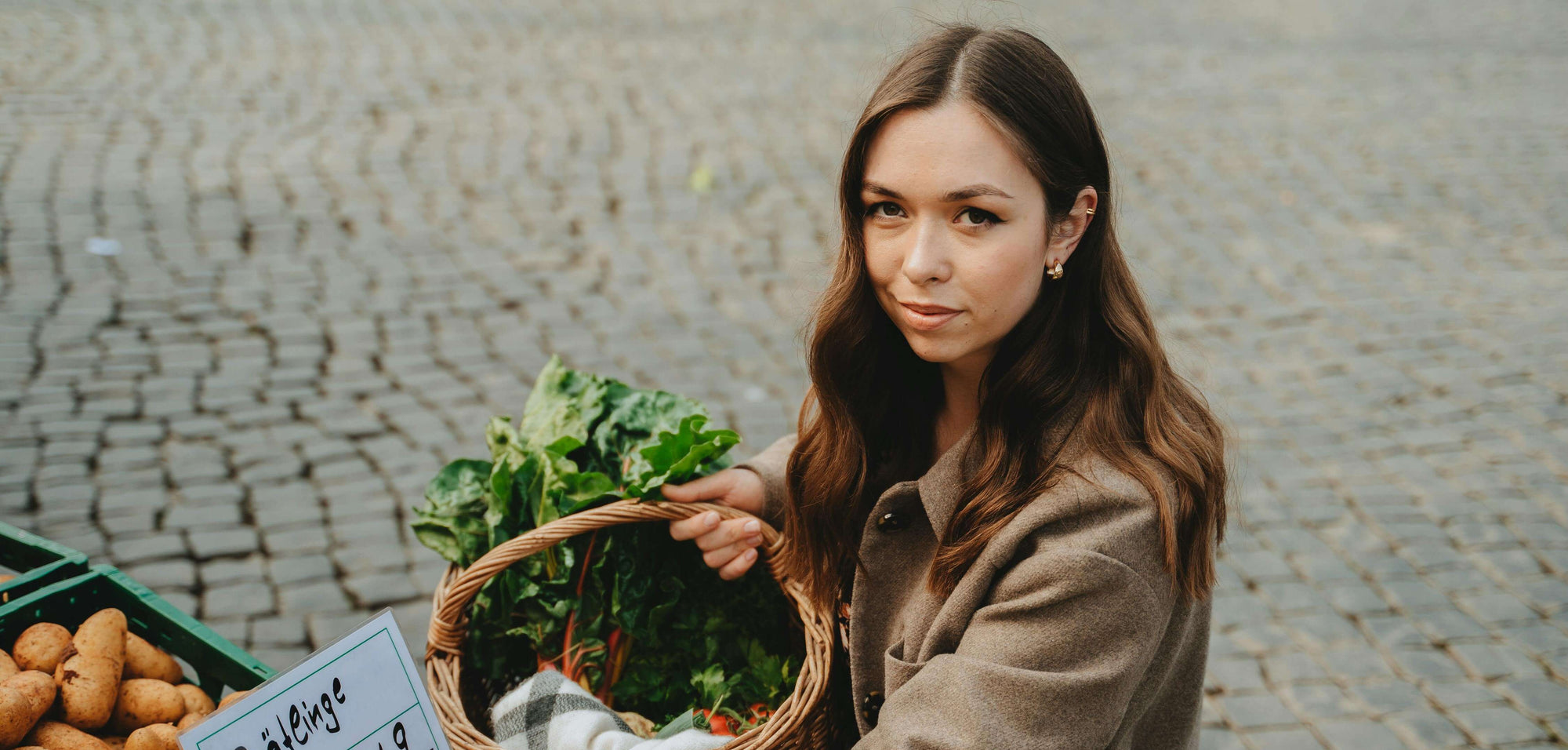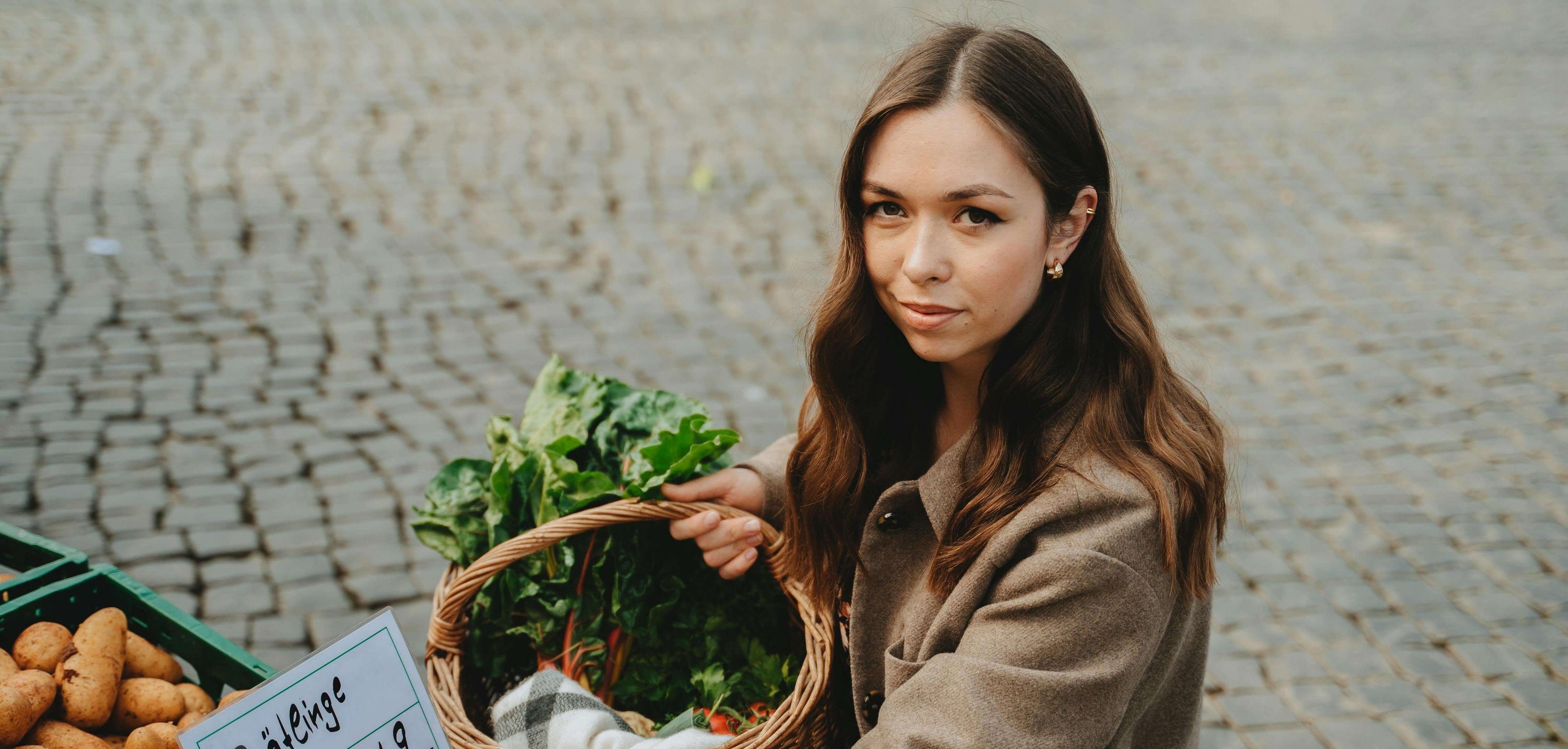


· By Mercedes Pepper
Is Your Skincare Really Locally Grown?
Let’s Bring the Farmers Market to Skincare!
You’re probably familiar with the movement to buy local, eat local, and support all things local. But what does “locally grown” mean for your skincare products? Ever curious? This buzzword suggests a promise of purity and community support, yet, the reality of these claims often remains vague. Let’s dive into why transparency in skincare sourcing should be on your mind, especially if you care about it for the food you consume.
I’m not talking about handcrafted skincare sold at a farmers market…
When I mention “locally grown” skincare, I’m not just referring to handcrafted goodies you might find at farmers markets.
I’m talking about knowing where each plant ingredient is from.
If a product contains “locally grown” plant ingredients, awesome, but where exactly is “local?!”
Does it mean local within 20 miles? Or local within a county, a state, or a continent - like our nation North America?
It’s easy to get caught up in the charm of “locally grown” labels, but without clear information about where ingredients come from, the term “local” loses its meaning. So, let’s peel back the layers and examine what “local” really means in the context of skincare.
How can something be called local if you can't find out where it’s from?!
It’s concerning that companies can call something local if customers can’t find out where it’s from. You’ve gotta know the location in question to be able to consider something local to it, right?
I mean, you probably wouldn’t purchase a pricey organic tomato at a farmers market if they couldn’t tell you where it was grown.

The same goes for that local, grass-fed organic beef - you would want to know where it's from.
Yet, we’re buying “local” plant-based skincare without knowing where its ingredients are from. The lack of transparency from skincare companies is puzzling. Why should we accept vague claims about our skincare products when we demand clear information about the food we eat?
Many of us care about what we put IN our bodies and where it comes from.
We’re careful about what we eat, making sure we know where our food comes from.
Unethical Practices: Local Skincare is the New Greenwashing
Local, plant-based skincare seems to be everywhere these days. Countless products claim to use local ingredients. But, these claims often lack substance and transparency. That contributes to an unsettling trend of “local greenwashing” in the skincare industry.
Several skincare brands are saying they use ingredients that are locally grown. They mention local growers, local wildcrafters, or their farms…
Yet, that’s pretty much all they share. Some brands will include the caveat that “most of” their ingredients are local or just their “plant actives” are.
It's awesome when brands share their one-to-maybe-three local or farm ingredient suppliers.
But sharing all suppliers? Most brands will not.
What about the origins of the remaining ingredients?
I can't help but wonder about the rest of the product… Do the remaining unknown ingredient origins make up 90% of the product, or is it closer to 98%? And where exactly do those ingredients come from?
Conversely, how much of the formula do the known origin ingredients account for? Is it a mere 1%? Or do they get close to the 10% mark?
Other times, we don't even know which ingredients in a product are the local ones.
In short, brands are making “local” claims without evidence.
I’d say this is a form of greenwashing.
And it’s time we demand more from “locally grown” skincare brands.
If you’re paying for a product that’s marketed as locally grown, you deserve to know where it’s really from.

How "locally grown” is the bottle you're holding?
Let’s get real for a second. Consider the scale of a skincare brand. The idea that all plant ingredients come from one magical farm, a backyard, or are foraged from the wilderness is a bit of a stretch, even for a small brand.
Think about it - most manufacturers' lowest order amount permitted is around 5,000 units per product (the majority are higher). That's a lot! If a brand's products are small in size, and the locally grown ingredient is used in a very small amount, it’s a little more realistic. But, your small to average skincare company sells way more than 5,000 units!
So, how “locally grown” or “wild-crafted” are the bottles on your shelves, really?
It feels like we’re left hanging without the full story. Let’s peel back those layers and demand transparency about the true origins of our skincare products.
Why do many brands talk up the locally grown farm vibe of their fresh ingredients?
Many brands tout a locally grown farm vibe, but often, these claims raise more questions than answers. For example, there’s a very high-end luxury brand (who will remain nameless) that claims to use only locally grown and organic ingredients. Yet, a closer look at their ingredient list makes this claim hard to believe…
Why the skepticism? Well, for several reasons, but here are my top three:
- Some of their ingredients aren’t grown or manufactured in North America.
- I spent an extensive amount of time identifying which countries' plant ingredients are native to and investigating their supply chain. I learned which ones you can get from the USA or North America, and which ones you have to import because there aren’t local producers. I explored using a few ingredients this luxury brand uses, but nixed them because there aren’t any growers or manufacturers in North America for them (pretty damn positive!). Plus, when digging deeper, some of these ingredients aren't cultivated sustainably.
- Obtaining the astronomical amount of raw material needed and extra costs to make their ingredients is unlikely for a small independent brand.
- It's highly doubtful they’d undertake making their extracts or pressing their oils. Depending on the oil, you’d need a specialized manufacturer to process the raw plant material, and you’d need a lot of it. Making a basic plant extract in glycerine or alcohol is easier though. Then there's testing in a lab. It can be done, but overall, the costs of doing this would be too high for a small brand using small amounts. Many big brands don’t even do this!
- Many local small organic farmers aren’t certified organic due to the cost and time-consuming process.
- These “small local farms” very well may be organic and use organic farming practices, but getting an organic certification is hard. The process can take several years, is very costly, and is time-consuming with all the requirements and paperwork. Farmers already don’t have enough time! So, really only medium-to-big farms and corporate farms get certified. Your average small farm or family farm doesn’t have this type of money or time for the initial certification or the annual payments and upkeep. As a conscious consumer, know that many small businesses and farmers don’t have the resources for labels - such as organic, free-range, and fair trade. So, is this luxury brand’s own small farm undergoing certification, and are their small organic local farmers? Very likely, not. Yet, they claim they’re 100% Organic… And there are regulations in the US for making organic claims. So the local farmers' lingo is the easiest place to deceive customers as it’s not regulated.
This company could very well place orders for its organic ingredients from a local supplier. But, a supplier is a distributor.
Suppliers aren’t local growers or farmers.
The truth is, most skincare brands work with suppliers, not directly with local growers or farmers.
The majority of suppliers are middlemen, sourcing their ingredients from other suppliers. There are a few suppliers who source their ingredients directly from manufacturers who work with the actual growers. As you can see, the “locally grown” claims we see on product labels aren’t exactly accurate.
Let’s stop the locally grown farmer greenwashing and simply be honest and transparent.
Brands should openly state where their ingredients come from. They can say they get ingredients from local suppliers who get them from farmers in certain countries. It’s not so hard.
But, then these companies likely wouldn’t be able to charge their exorbitant price tag if you knew the traceability of their “seed to skin” products. I know of many pricy products that are "locally grown," but looking at their ingredients, I'm pretty damn sure they import at least 80% of it. They mask the truth behind appealing, but vague “locally grown” labels.
Take note, nothing is wrong with importing ingredients! What I take issue with is misleading you.
Traceability is a choice businesses can make. And you as a customer have a right to know your skincare products' ingredient traceability.

Surf+Slope is Locally Grown Skincare
Enter Nation Botanics, a skincare brand with a commitment to truly locally grown skincare and a visible supply chain. Nation Botanics aims to break these vague and misleading sourcing and sustainability claims. I strive to ensure you know where each ingredient you apply on your precious face is from.
To do this, Nation Botanics goes directly to the grower and farmer when possible. When this isn’t possible, I go to the supplier with the highest quality products. And one who knows where, and tells me where, these ingredients are grown, where they’re manufactured, and how they then get to me - Nation Botanics.
This is because I’ve built personal relationships with Surf+Slope’s local farmers and suppliers. They’ve shared with me the states or locations of the soil they grow ingredients in and the cultivation methods of their food and/or plants.
‘Cause you deserve to know.
Not all of the businesses Nation Botanics sources from have certifications, such as organic, but they’ve shared their specific organic and/or regenerative farming practices. These conversations bypass the need for formal certifications in my mind. This is because, as noted above, not all farmers get these certifications due to financial and logistical constraints. A certification is a certification. It doesn't reflect a farmer's commitment to certain standards.
I use a straightforward and honest approach.
77% of Surf+Slope’s ingredients are organic, wildcrafted, and/or zero-waste (upcycled).
As a small and independent, yet big-thinking start-up, Nation Botanics aims to disclose every component.
…so you know where Surf+Slope’s Revitalizing Serum and Nourishing Moisturizer plant ingredients are from.
Nation Botanics is beyond basic ingredient transparency.
This commitment supports greater accountability in the skincare industry.
The industry is only beginning to embrace this practice. Currently, there's a basic level of ingredient transparency - brands list the ingredients but don't share the supply chain. A few exemplary brands are taking steps further. They'll share the countries in their ingredient supply chain, or a few select ingredient suppliers.

Let’s Define Local
So, what do we mean by “local”? At Nation Botanics, “local” is defined as North America.
Creating a high-end skincare product using plants native to North America, and locally sourced from here, requires a larger territory than one county or state can provide.
But, North America? That can be done - by prioritizing the closest US farmers and communities.
Think of Nation Botanics as a North American farmers market for your skin.
Nation Botanics is about supporting local farmers, promoting healthy skin, and upholding transparency every step of the way.
Local Farmers for Healthy Skin
Supporting locally grown skincare is about more than just having healthy, glowing skin. It’s about supporting North American agriculture and the communities these farmers live in.
The Surf+Slope Revitalizing Serum and Nourishing Moisturizer uses locally grown products. It has a visible supply chain with 98% of ingredients growing wild in North America and 92% grown by farmers in North America.
You know where each ingredient is from and that these raw materials are ethically sourced. As a customer, you deserve to know how this side of the business is done too.
Unlike other brands, you can see where Nation Botanics’ locally grown products are from and ethically sourced with this map:

Learn more on our traceable page here.
Let’s connect with nature that surrounds us. Let’s support and enjoy plant-based skincare that’s like a North American farmers market.
Summary
In conclusion, understanding the origins of our skincare ingredients is new, but important. It’s time we look beyond charming “locally grown”or similar claims on skincare products and seek actual locations or data to back claims up.
Nation Botanics hopes to lead the way, offering truly locally grown skincare with a visible supply chain. By choosing Nation Botanics, you’re both caring for your skin and supporting local agriculture and communities.
Let’s make a conscious choice to know where our skincare ingredients come from. Let's also call for transparency and honesty in marketing practices. I hope you’ll join me by supporting brands with true locality instead of greenwashing.
Frequently Asked Questions
Why aren’t you listing all of your farmers and suppliers?I'm keen to shout out my farmers/suppliers and help their small businesses grow along with mine. But, since I'm just starting out in the big skincare world with limited resources, I'm going to play it safe at first... I'm letting you know where my ingredients come from, the real places they're grown - which is ahead of the industry already! And little by little, I'll introduce my suppliers to you. I hope this openness doesn't put my budding little business at risk. Fingers crossed, we'll all flourish together!
What is greenwashing in the skincare industry?Greenwashing in the skincare industry involves misleading claims about the environmental benefits of an ingredient, the product, or the business as a whole. Claims often include vague or false statements about the nature of ingredients. Be cautious of such claims when selecting skincare products if there’s nothing to back it up!
What is meant by locally produced?"Locally produced" means goods that are grown or made near the consumer. This reduces the distance between the producer and the consumer. It’s unlike products transported across the world in our globalized system.
What does "locally grown" mean in the context of skincare?"Locally grown" in skincare refers to ingredients sourced from a specific region or area. The definition of "local" may vary by brand, such as North America for Nation Botanics, but typically you assume it’s local as in within 100-500 miles.
